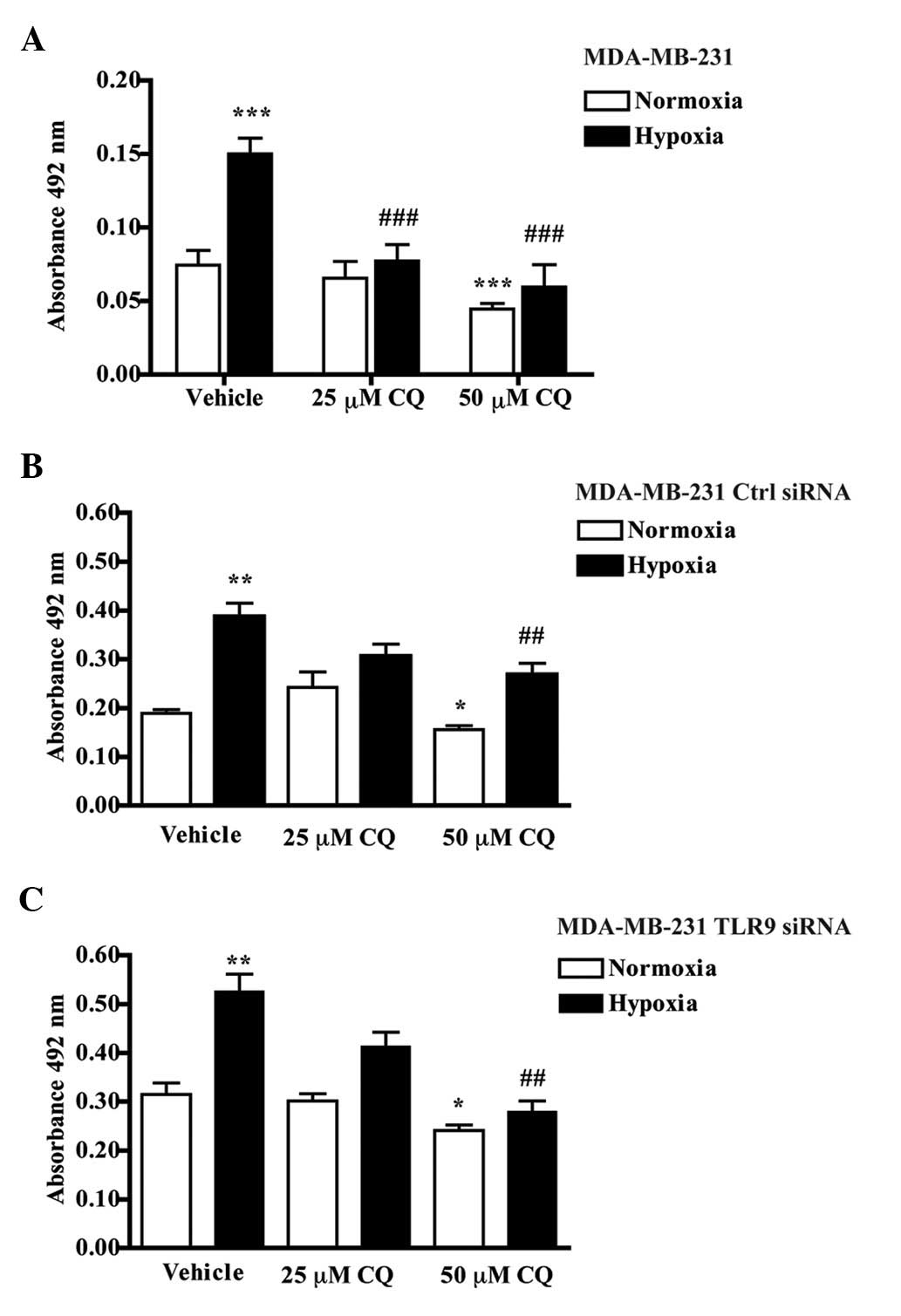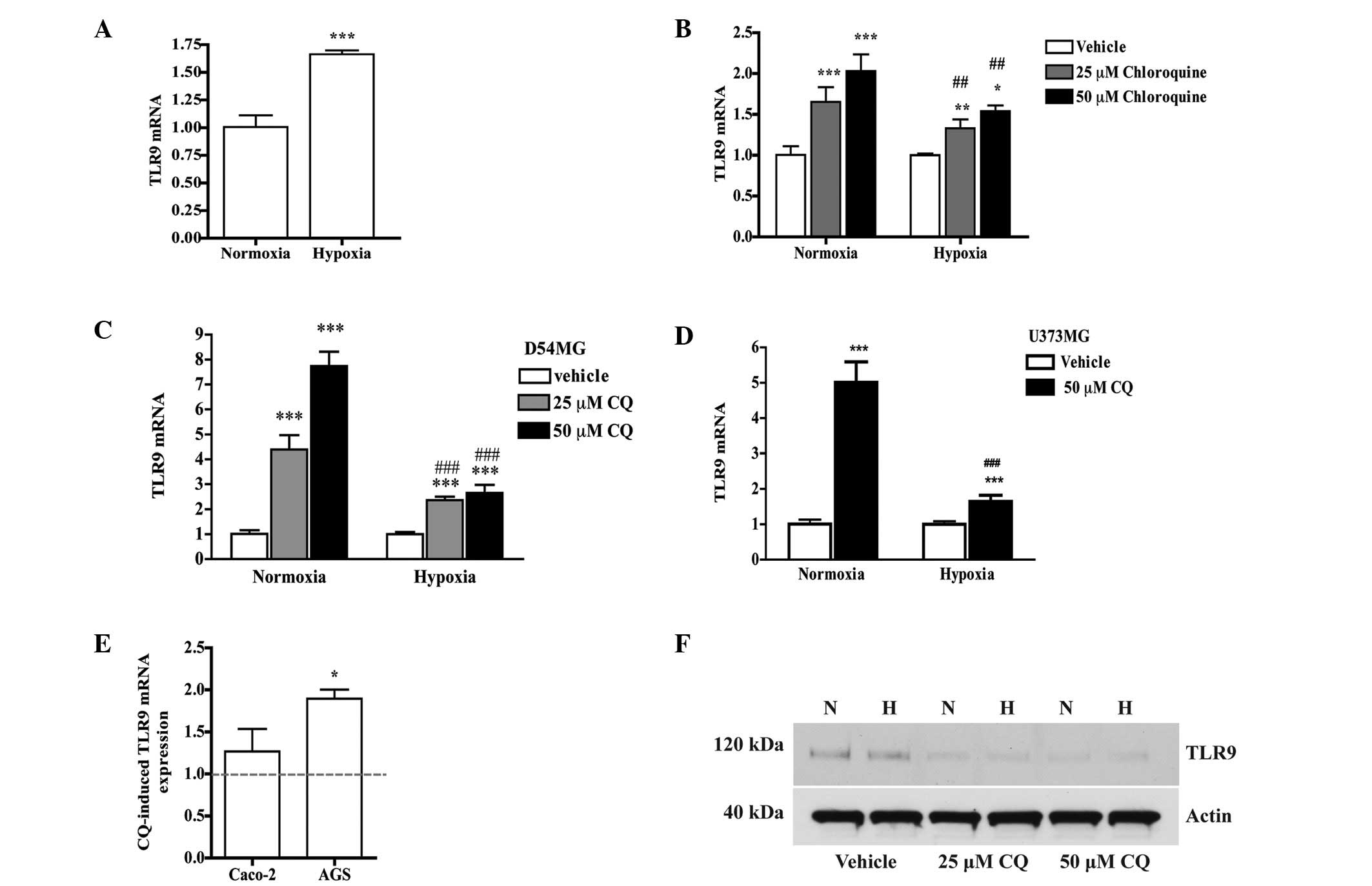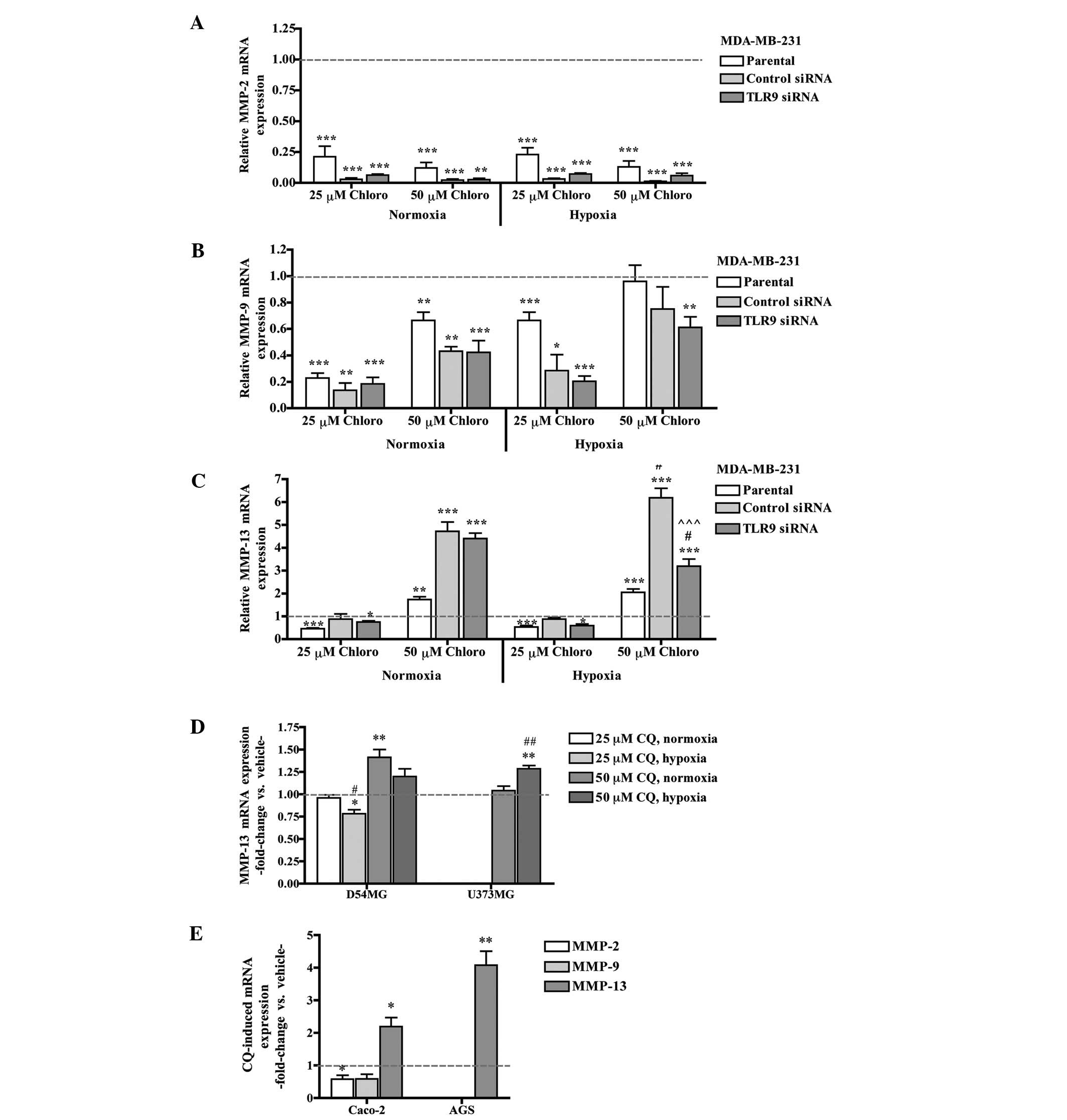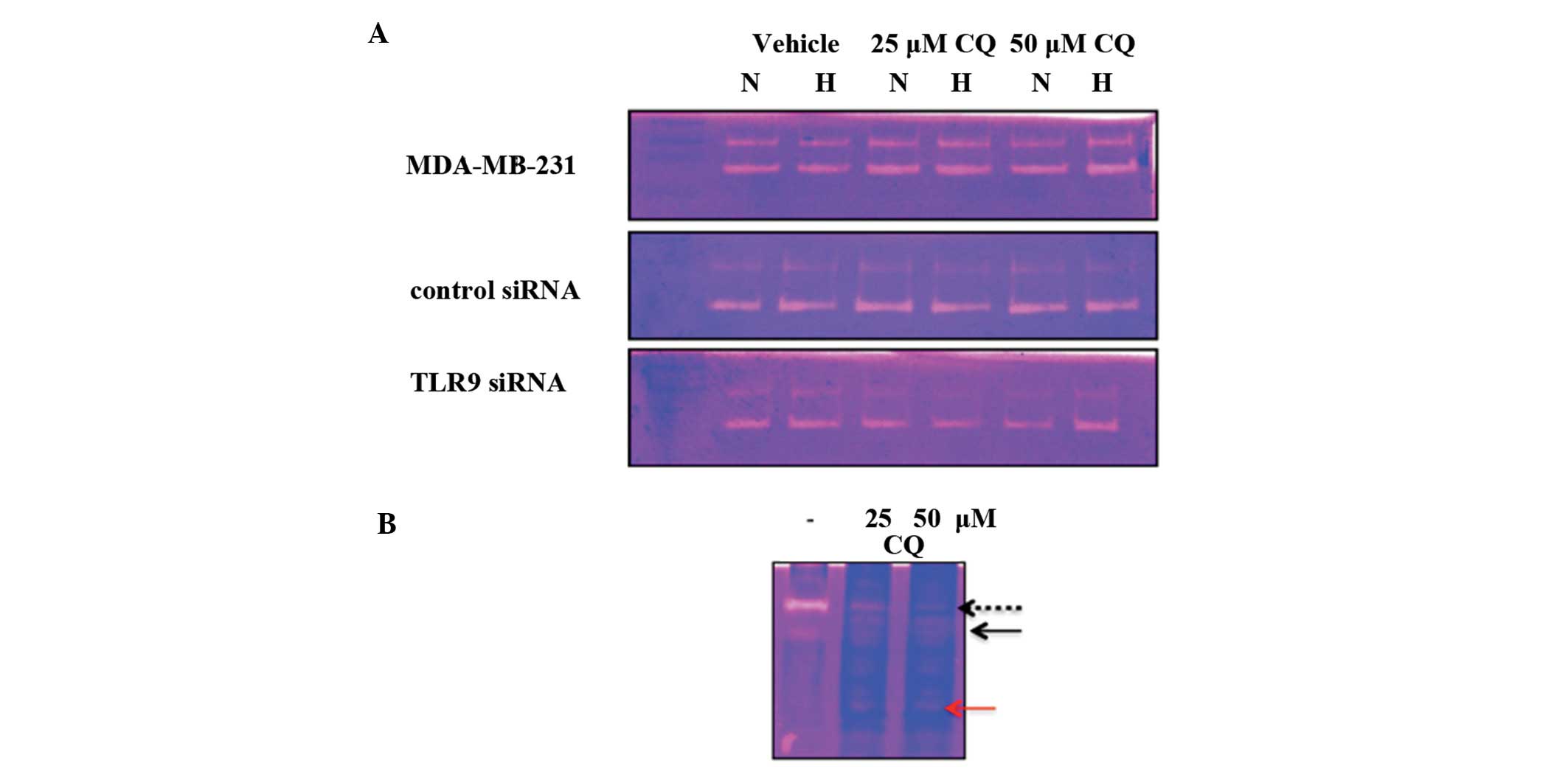|
1
|
Elias AD: Triple-negative breast cancer: a
short review. Am J Clin Oncol. 33:637–645. 2010. View Article : Google Scholar : PubMed/NCBI
|
|
2
|
Carotenuto P, Roma C, Rachiglio AM, Botti
G, D’Alessio A and Normanno N: Triple negative breast cancer: from
molecular portrait to therapeutic intervention. Crit Rev Eukaryot
Gene Expr. 20:17–34. 2010. View Article : Google Scholar : PubMed/NCBI
|
|
3
|
Hemmi H, Takeuchi O, Kawai T, Kaisho T,
Sato S, Sanjo H, Matsumoto M, Hoshino K, Wagner H, Takeda K and
Akira S: A Toll-like receptor recognizes bacterial DNA. Nature.
408:740–745. 2000. View
Article : Google Scholar : PubMed/NCBI
|
|
4
|
Di JM, Pang J, Pu XY, Zhang Y, Liu XP,
Fang YQ, Ruan XX and Gao X: Toll-like receptor 9 agonists promote
IL-8 and TGF-beta1 production via activation of nuclear factor
kappaB in PC-3 cells. Cancer Genet Cytogenet. 192:60–67. 2009.
View Article : Google Scholar : PubMed/NCBI
|
|
5
|
Assaf A, Esteves H, Curnow SJ and Browning
MJ: A threshold level of TLR9 mRNA predicts cellular responsiveness
to CpG-ODN in haematological and non-haematological tumour cell
lines. Cell Immunol. 259:90–99. 2009. View Article : Google Scholar : PubMed/NCBI
|
|
6
|
Ilvesaro JM, Merrell MA, Li L, Wakchoure
S, Graves D, Brooks S, Rahko E, Jukkola-Vuorinen A, Vuopala KS,
Harris KW, et al: Toll-like receptor 9 mediates CpG
oligonucleotide-induced cellular invasion. Mol Cancer Res.
6:1534–1543. 2008. View Article : Google Scholar : PubMed/NCBI
|
|
7
|
Ilvesaro JM, Merrell MA, Swain TM,
Davidson J, Zayzafoon M, Harris KW and Selander KS: Toll like
receptor-9 agonists stimulate prostate cancer invasion in vitro.
Prostate. 67:774–781. 2007. View Article : Google Scholar : PubMed/NCBI
|
|
8
|
Merrell MA, Ilvesaro JM, Lehtonen N, Sorsa
T, Gehrs B, Rosenthal E, Chen D, Shackley B, Harris KW and Selander
KS: Toll-like receptor 9 agonists promote cellular invasion by
increasing matrix metalloproteinase activity. Mol Cancer Res.
4:437–447. 2006. View Article : Google Scholar : PubMed/NCBI
|
|
9
|
Tuomela J, Sandholm J, Karihtala P,
Ilvesaro J, Vuopala KS, Kauppila JH, Kauppila S, Chen D, Pressey C,
Härkönen P, et al: Low TLR9 expression defines an aggressive
subtype of triple-negative breast cancer. Breast Cancer Res Treat.
135:481–493. 2012. View Article : Google Scholar : PubMed/NCBI
|
|
10
|
Neve RM, Chin K, Fridlyand J, Yeh J,
Baehner FL, Fevr T, Clark L, Bayani N, Coppe JP, Tong F, et al: A
collection of breast cancer cell lines for the study of
functionally distinct cancer subtypes. Cancer Cell. 10:515–527.
2006. View Article : Google Scholar : PubMed/NCBI
|
|
11
|
Sandholm J, Kauppila JH, Pressey C,
Tuomela J, Jukkola-Vuorinen A, Vaarala M, Johnson MR, Harris KW and
Selander KS: Estrogen receptor-α and sex steroid hormones regulate
Toll-like receptor-9 expression and invasive function in human
breast cancer cells. Breast Cancer Res Treat. 132:411–419.
2012.
|
|
12
|
Chaudary N and Hill RP: Hypoxia and
metastasis in breast cancer. Breast Dis. 26:55–64. 2007.
|
|
13
|
Ramos-DeSimone N, Hahn-Dantona E, Sipley
J, Nagase H, French DL and Quigley JP: Activation of matrix
metalloproteinase-9 (MMP-9) via a converging plasmin/stromelysin-1
cascade enhances tumor cell invasion. J Biol Chem. 274:13066–13076.
1999. View Article : Google Scholar : PubMed/NCBI
|
|
14
|
Yeomans ND: Aspirin: old drug, new uses
and challenges. J Gastroenterol Hepatol. 26:426–431. 2011.
View Article : Google Scholar : PubMed/NCBI
|
|
15
|
Vazquez-Martin A, López-Bonetc E, Cufi S,
Oliveras-Ferraros C, Del Barco S, Martin-Castillo B and Menendez
JA: Repositioning chloroquine and metformin to eliminate cancer
stem cell traits in pre-malignant lesions. Drug Resist Updat.
14:212–223. 2011. View Article : Google Scholar : PubMed/NCBI
|
|
16
|
Solomon VR, Hu C and Lee H: Design and
synthesis of chloroquine analogs with anti-breast cancer property.
Eur J Med Chem. 45:3916–3923. 2010. View Article : Google Scholar : PubMed/NCBI
|
|
17
|
Espina V, Mariani BD, Gallagher RI, Tran
K, Banks S, Wiedemann J, Huryk H, Mueller C, Adamo L, Deng J, et
al: Malignant precursor cells pre-exist in human breast DCIS and
require autophagy for survival. PLoS One. 5:e102402010. View Article : Google Scholar : PubMed/NCBI
|
|
18
|
Hu C, Raja Solomon V, Cano P and Lee H: A
4-aminoquinoline derivative that markedly sensitizes tumor cell
killing by Akt inhibitors with a minimum cytotoxicity to non-cancer
cells. Eur J Med Chem. 45:705–709. 2010. View Article : Google Scholar : PubMed/NCBI
|
|
19
|
Rahim R and Strobl JS: Hydroxychloroquine,
chloroquine, and all-trans retinoic acid regulate growth, survival,
and histone acetylation in breast cancer cells. Anticancer Drugs.
20:736–745. 2009. View Article : Google Scholar : PubMed/NCBI
|
|
20
|
Loehberg CR, Thompson T, Kastan MB,
Maclean KH, Edwards DG, Kittrell FS, Medina D, Conneely OM and
O’Malley BW: Ataxia telangiectasia-mutated and p53 are potential
mediators of chloroquine-induced resistance to mammary
carcinogenesis. Cancer Res. 67:12026–12033. 2007. View Article : Google Scholar : PubMed/NCBI
|
|
21
|
Loehberg CR, Strissel PL, Dittrich R,
Strick R, Dittmer J, Dittmer A, Fabry B, Kalender WA, Koch T,
Wachter DL, et al: Akt and p53 are potential mediators of reduced
mammary tumor growth by Chloroquine and the mTOR inhibitor RAD001.
Biochem Pharmacol. 83:480–488. 2012. View Article : Google Scholar : PubMed/NCBI
|
|
22
|
Jiang PD, Zhao YL, Deng XQ, Mao YQ, Shi W,
Tang QQ, Li ZG, Zheng YZ, Yang SY and Wei YQ: Antitumor and
antimetastatic activities of chloroquine diphosphate in a murine
model of breast cancer. Biomed Pharmacother. 64:609–614. 2010.
View Article : Google Scholar : PubMed/NCBI
|
|
23
|
Yerlikaya A, Okur E and Ulukaya E: The
p53-independent induction of apoptosis in breast cancer cells in
response to proteasome inhibitor bortezomib. Tumour Biol.
33:1385–1392. 2012. View Article : Google Scholar : PubMed/NCBI
|
|
24
|
Kuznik A, Bencina M, Svajger U, Jeras M,
Rozman B and Jerala R: Mechanism of endosomal TLR inhibition by
antimalarial drugs and imidazoquinolines. J Immunol. 186:4794–4804.
2011. View Article : Google Scholar : PubMed/NCBI
|
|
25
|
Zhu X, Pan Y, Li Y, Jiang Y, Shang H,
Gowda DC, Cui L and Cao Y: Targeting Toll-like receptors by
chloroquine protects mice from experimental cerebral malaria. Int
Immunopharmacol. 13:392–397. 2012. View Article : Google Scholar : PubMed/NCBI
|




















